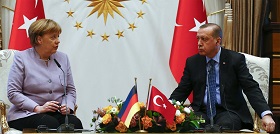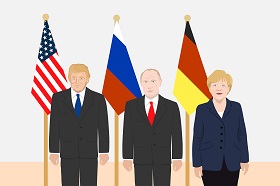The Bundestag elections that took place on Sunday September 24, 2017 yielded a number of surprises. Despite major losses, the Christian Democratic Union and their Bavarian partners led by Angela Merkel emerged as formal winners, although the real winners are the AfD, which almost tripled its results from 2013 (4.7 per cent), and the Free Democratic Party, which returned to the lower house of the federal parliament with surprisingly high results (compared to 4.9 per cent in 2013).
The CDU/CSU and the SDP failed to win over undecided voters (and there was an unusually high number of such voters before the elections — between one third and one half of all voters, according various estimates) and achieve their goals.
The new Bundestag will have new MPs specializing in relations with Russia. Several renowned politicians who had largely determined the contents and progress of discussions and debates on Russia–Germany relations are now leaving Bundestag, for instance, G. Erler, B. Kaster, F. Toennies, M. Beck.
Talks on forming a new government may fail; such a probability clearly exists. In this case, the Federal President must call a new election. Russia is interested in Germany forming a new government as quickly as possible.
The Bundestag elections that took place on Sunday September 24, 2017 yielded a number of surprises. Contrary to predictions, the 76.2 per cent voter turnout was significantly higher than in 2013 (71.5 per cent). Exit polls conducted by Germany’s leading demoscopic institutions predicted a different outcome. Preliminary calculations pointed to the following distribution of votes among the parties and individual candidates: CDU/CSU (the coalition between the Christian Democratic Union of Germany and the Christian Social Union in Bavaria) — 33 per cent (246 seats); the Social Democratic Party of Germany — 20.5 per cent (153); Alternative for Germany (AfD) — 12.6 per cent (94); the Left Party — 9.2 per cent; the Free Democratic Party — 10.7 per cent (80); Alliance 90/The Greens — 8.9 per cent (67); and other parties — 5.1 per cent [1]. For the first time in the history of unified Germany, the Bundestag will include seven parties and six factions, with a total of 709 seats.
Despite major losses, the Christian Democratic Union and their Bavarian partners led by Angela Merkel emerged as formal winners, although the real winners are the AfD, which almost tripled its results from 2013 (4.7 per cent), and the Free Democratic Party, which returned to the lower house of the federal parliament with surprisingly high results (compared to 4.9 per cent in 2013). Just like its leaders predicted, the Alternative will now be the third-largest faction in Germany, and the largest among the established small parties. In response to its political rivals labelling it a “political pariah,” the AfD had refused to cooperate with other parties even before the elections, stressing that they had “outlived themselves” and no longer represented the real interests of the German people.
The CDU/CSU and the SDP failed to win over undecided voters (and there was an unusually high number of such voters before the elections — between one third and one half of all voters, according various estimates) and achieve their goals. The so-called non-electors mostly voted for small parties. The election programmes labelled “governmental” by the two popular parties turned out to be rather ineffectual, as did the efforts of the two candidates for chancellorship — Angela Merkel and Martin Schultz — and the billboards and personal campaigning. These parties and their leaders are largely responsible for a rather stale electoral campaign and their fairly boring TV duel on September 3, 2017, which did not live up to the expectations of German citizens. Mr. Schultz deserves credit for continuing to fight to the bitter end, even though he was losing in the popularity polls to the incumbent Chancellor. He managed to gather thousands of admiring followers at his rallies (at Gendarmenmarkt in central Berlin on September 22, for instance) and made successful TV appearances shortly before the election. He was the most discussed leading-party politician on Twitter. Ms. Merkel also deserves credit for presenting herself as a careful strategist and tactician, especially when she successfully played the traditional Social Democratic field of social justice at the end of her electoral campaign. Yet ultimately, German voters rendered an impartial verdict on the parties in the current coalition that will force the parties’ leaders to revise their strategies.
Unlike the Social Democrats, the incumbent head of government refused from the outset to discuss possible governmental coalitions. Instead, she suggested that the parties should wait for the final vote, and ruled out an alliance with The Left and the AfD entirely. Now the Chancellor has only two options left: continue cooperation with the SDP or form an alliance with the Free Democrats and the Greens. Before the final vote was in, it was hard to say which variant Ms. Merkel and her partners would opt for. Given Social Democrats’ strikingly low results and the high probability that they will not move into the opposition, unequivocal priority is now given to the black-yellow-green “Jamaica.”
Mathematically, though, the Grand Coalition may still re-emerge. The following factors, taken together with the statement the SDP leadership made immediately after the election about moving into the ranks of the opposition, speak against this option:
- Many party members are unwilling to repeat the history of being a junior partner, especially given the current very low results. The party base is unlikely to authorize such talks.
- The understanding that such a coalition should not become a rule: the CDU/CSU and the SDP should remain political rivals.
- The opinion that the party can only be revitalized through strong parliamentary opposition which, on the one hand, would allow the party’s members to harshly criticize the CDU/CSU, while on the other hand counteracting the AfD faction asserting itself in Bundestag. Otherwise, the AfD will become the leading opposition force.
- The Social Democrats do not have any new breakthrough projects (such as a minimum wage, for instance) that must be realized.
- The probability that the possible “Jamaican” coalition will have collapsed by 2021, and then the SDP will join the government as a sort of a political life-saver.
The following arguments could be used to support continued cooperation with the CDU/CSU:
- The need to preserve/ensure stability in the country should the CDU/CSU’s talks with the Free Democrats and the Greens fail.
- The similarity between the “governmental” electoral programmes and the constructive experience of the past four years in brokering compromises.
- The opportunity for the SDP to realize its campaign promises in the next four years.
- The fact that there is no guarantee that going into opposition will revitalize the party.
Clearly, the “con” arguments are far weightier, and the chances of forming a Grand Coalition are small. Besides, there is some uncertainty as to whether Mr. Schultz is capable of remaining the party’s leader. The extremely poor election results could put changing the party’s leadership on the agenda. This, however, is a subject for another discussion.
Thus, the black-yellow-green coalition has the greatest chances today. The main problem with forming such a coalition is the personal animosity and confrontation between members of the FDP and the Alliance 90/Greens (with the latter receiving an unexpectedly high number of votes in the election). At the same time, all the potential partners have quite a number of crucial programmatic differences. A government that includes the Free Democrats would also pose a sort of a problem for the Germany–France tandem due to the divergent approaches of the FDP and Emmanuel Macron and his party to the issues of the EU’s political construction. Incidentally, the leader of the Free Democrats, Christian Lindner, has already announced he would prefer working in parliament to working in the government. In any case, potential talks will be very complicated and unpredictable.
Most likely, the Social Democrats will form the principal opposition force. If the SDP joins the government, the AfD will become the Bundestag’s leading opposition force: it will gain a series of leading offices in committees and priority speech rights during debates. Its principal goals for the 19th Bundestag include: positing itself as a centrist party; clearing its image of populism and right-wing radicalism; preventing a schism within its own ranks; avoiding the traditional dangers associated with rapid growth and political genesis; and forming a stable base. From the point of view of being in opposition to governmental parties, the AfD’s MPs in the Bundestag will focus on Euro-scepticism, counteracting the influx of illegal migrants, and bolstering domestic security. It should be noted that the AfD does not have major differences with other parties’ electoral programmes.
We can assume that, during coalition talks, Ms. Merkel will attempt to rely on those issues that should constitute breakthrough areas for the future government, and show voters that she remains the unofficial leader and that the CDU/CSU alliance is viable and competent in its policies. It should be noted that the alliance itself has accumulated a number of contradictions and problems that the party leadership will have to tackle in the near future.
The new Bundestag will have new MPs specializing in relations with Russia. Several renowned politicians who had largely determined the contents and progress of discussions and debates on Russia–Germany relations are now leaving Bundestag, for instance, G. Erler, B. Kaster, F. Toennies, M. Beck. New members will join the inter-parliamentary group on Bundestag–Duma relations. We may hope for continuity here.
Talks on forming a new government may fail; such a probability clearly exists. In this case, the Federal President must call a new election. Russia is interested in Germany forming a new government as quickly as possible. For the Kremlin, both variants considered are acceptable, including the “Jamaica” variant, despite relatively harsh statements made about Russia during the election campaign.
1. As of 8am Moscow time, September 25, 2017.






